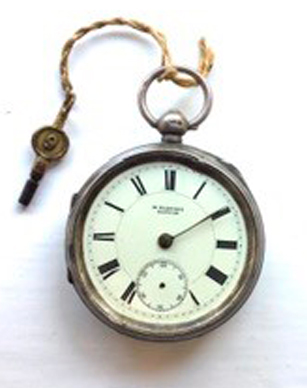
This pocket watch originally owned by Owen Owen(s) dates from around 1900. Owen Owen(s) was born in Bangor, Caernarfonshire in 1856 the son of shipwright carpenter, Owen Owens of Holyhead. The family lived at 11, Strand Street, in the southern part of Hirael in Bangor near ‘Port Penrhyn’. In the 1870s, Owen began working as a ship’s carpenter and sailed overseas. There is a record of him working as a carpenter on the ship ‘Alice Platt’ which travelled from Liverpool to Melbourne, Australia in 1880. In 1882 Owen married Margaret Rowlands of Aberystwyth and their two eldest daughters were born in Bangor.
Owen and his family moved to Hoose to be near to the port at Liverpool, but after this he gave up seafaring and worked as a carpenter on land. Here four more children were born to them. By the early 20th century the family moved to Llanarmon-yn-Iâl, Denbighshire with one maid, Catherine Hughes who was born in Bangor. Owen chose a new career farming first at ‘Ty’n Twll’ and then at ‘Plas Du’ in the parish of Llanarmon-yn-Iâl.
The name ‘M Wartski is on the front of the pocket watch, and it was manufactured by the Lancashire Watch Company. In the 19th century many Jews emigrated to Britain, escaping persecution in Eastern Europe. Several settled in Bangor and established successful businesses, also becoming part of the cultural, social and political life of the area. The two most famous figures in Bangor were Phillip Pollecoff who emigrated from Russia in the 1880s and set up successful shops in Bangor, Caernarfon and Pwllheli – the dress shop in Pwllheli still exists- and Morris Wartski who opened a jewellery and fine clothing shop in Bangor in 1895. It was the start of the very prestigious Wartski jewellery empire that specialised in Fabergé eggs in the early 20th century. It benefited from the patronage of Edward VII and the colourful 5th Marquis of Anglesey. Morris Wartski’s son Isidore became mayor of Bangor.
This pocket watch is on display in the community case in the foyer during January.
